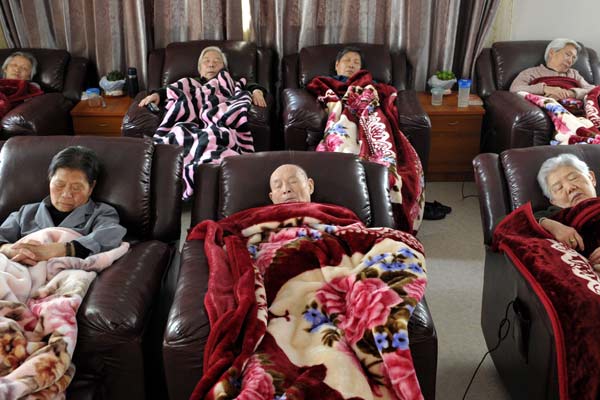Efforts needed to address the issues that make homeowners and financial institutions wary of houses for pensions
This month the State Council pledged to complete a social care network for people aged 60 or above by 2020. Among the proposed policies that are dedicated to serving the world's largest elderly population, the reverse mortgage loan plan has received mixed responses.

Senior citizens sleep at a daytime service center in Shanghai in April. The city has 3.67 million people aged 60 or older, accounting for 25.7 percent of its registered population.[Niu Yixin / for China Daily]
Under the policy, which is better known as a house-for-pension program, homeowners can deed their house over to an insurance company or bank, which will have the house appraised and calculate the applicant's life expectancy and then pay out a fixed amount of money every month. This would allow the elderly to live in his or her own house and receive regular payments for as long as they live. After they pass away, the house will be sold to repay the loan principal and interest, and the mortgagees will benefit from the increased value of the asset.
Reverse mortgages have become a practical choice for seniors across the United States, Canada, Japan and many other countries, as a financial tool to supplement people's pensions. In fact, the idea is not new in China. Back in 2003, the China Insurance Regulatory Commission submitted a report about reverse mortgages to the State Council, and several cities, including Shanghai and Nanjing, have tried the program since, but they have all fared poorly.
The China National Committee on Aging estimates that by the end of 2013, China will have more than 200 million citizens aged 60 or above, which will account for 14 percent of the total population. The existing number of public nursing homes cannot meet the growing demand of the rapidly aging population, and the new house-for-pension policy is intended to help the elderly live comfortable lives in their final years.
However, the State Council's latest proposal for reverse mortgages, while only a pilot program, faces an uphill battle for acceptance. One key barrier is the widespread skepticism among the elderly themselves.